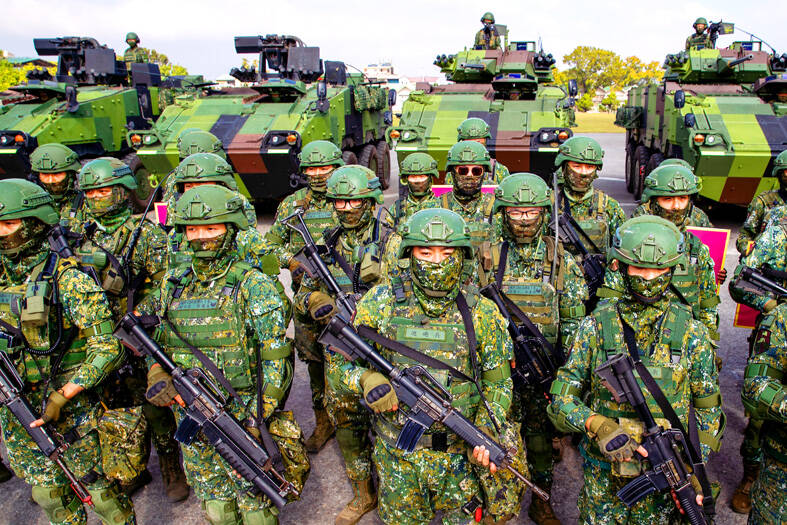Washington has expanded the training of Taiwanese troops by members of the US National Guard, the Nikkei Asia wrote in an exclusive report yesterday, citing anonymous sources familiar with the matter.
The expansion came after National Guard training programs helped Ukrainian forces repel a Russian invasion of the country, the Japanese newspaper wrote.
The National Guard is a strategic reserve force that is normally governed by US state governments and is called up to respond to natural disasters or civil unrest.

Photo: Ritchie B. Tongo, EPA-EFE
However, US law also allows it to be deployed by the US government.
President Tsai Ing-wen (蔡英文) in May last year unveiled plans for training programs under the National Guard, saying during a visit to Taipei by US Senator Tammy Duckworth that the US Department of Defense is “proactively planning cooperation between the US National Guard and Taiwan’s defense forces.”
Citing sources directly involved in the joint training program, the Nikkei reported that the National Guard started training Taiwanese forces before Tsai’s announcement, adding that some of the personnel had been dispatched to Taiwan from Hawaii.
The National Guard runs training programs involving military units from about 80 countries worldwide, mostly under the US State Partnership Program (SPP). The training differs from country to country and can include infantry tactics, air operations, cyberdefense, disaster response, counterterrorism and medical support. The training involving Taiwanese forces is not under the SPP.
Under the program, nations’ troops mostly cooperate with the National Guard from only one state, while the training in Taiwan involves personnel from multiple states, the Nikkei cited a source as saying.
Taiwan also has more training options than countries participating in the SPP, they said.
“We don’t have a comment on specific operations, engagements or training, but I would highlight that our support for, and defense relationship with, Taiwan remains aligned against the current threat posed by the People’s Republic of China,” the report quoted a Pentagon spokesperson as saying.
“Our commitment to Taiwan is rock-solid and contributes to the maintenance of peace and stability across the Taiwan Strait and within the region,” they said.
“Increased training through a partnership between Taiwan’s military and the US National Guard is, if confirmed, a significant step and one that has been talked about in Washington for a while,” the report quoted Jacob Stokes, a senior fellow at the Center for a New American Security think tank, as saying.
“US National Guard training would likely be focused on improving Taiwan’s ability to leverage its reserve forces to greater effect in support of a whole-of-society military mobilization plan,” he said.
The Wall Street Journal in October 2021 reported that US special operations forces had been deployed to Taiwan for at least a year to conduct small-unit tactics training with the Taiwanese military.
Separately, the Chinese-language Liberty Times (the Taipei Times’ sister newspaper) on Jan. 3 reported that Taiwan expects to broaden its cooperation with the National Guard on training, tactics and individual combat skills, as the nation resumes one-year conscription, citing an anonymous source.

AGING: As of last month, people aged 65 or older accounted for 20.06 percent of the total population and the number of couples who got married fell by 18,685 from 2024 Taiwan has surpassed South Korea as the country least willing to have children, with an annual crude birthrate of 4.62 per 1,000 people, Ministry of the Interior data showed yesterday. The nation was previously ranked the second-lowest country in terms of total fertility rate, or the average number of children a woman has in her lifetime. However, South Korea’s fertility rate began to recover from 2023, with total fertility rate rising from 0.72 and estimated to reach 0.82 to 0.85 by last year, and the crude birthrate projected at 6.7 per 1,000 people. Japan’s crude birthrate was projected to fall below six,

Conflict with Taiwan could leave China with “massive economic disruption, catastrophic military losses, significant social unrest, and devastating sanctions,” a US think tank said in a report released on Monday. The German Marshall Fund released a report titled If China Attacks Taiwan: The Consequences for China of “Minor Conflict” and “Major War” Scenarios. The report details the “massive” economic, military, social and international costs to China in the event of a minor conflict or major war with Taiwan, estimating that the Chinese People’s Liberation Army (PLA) could sustain losses of more than half of its active-duty ground forces, including 100,000 troops. Understanding Chinese

US President Donald Trump in an interview with the New York Times published on Thursday said that “it’s up to” Chinese President Xi Jinping (習近平) what China does on Taiwan, but that he would be “very unhappy” with a change in the “status quo.” “He [Xi] considers it to be a part of China, and that’s up to him what he’s going to be doing, but I’ve expressed to him that I would be very unhappy if he did that, and I don’t think he’ll do that. I hope he doesn’t do that,” Trump said. Trump made the comments in the context

SELF-DEFENSE: Tokyo has accelerated its spending goal and its defense minister said the nation needs to discuss whether it should develop nuclear-powered submarines China is ramping up objections to what it sees as Japan’s desire to acquire nuclear weapons, despite Tokyo’s longstanding renunciation of such arms, deepening another fissure in the two neighbors’ increasingly tense ties. In what appears to be a concerted effort, China’s foreign and defense ministries issued statements on Thursday condemning alleged remilitarism efforts by Tokyo. The remarks came as two of the country’s top think tanks jointly issued a 29-page report framing actions by “right-wing forces” in Japan as posing a “serious threat” to world peace. While that report did not define “right-wing forces,” the Chinese Ministry of Foreign Affairs was